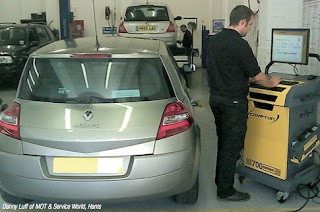EEC’s Technical Support Co-ordinator, Stuart Still, talks us through an interesting case he recently came across that would have seen the unnecessary replacement of a vehicle catalytic converter.
Picture the scenario: the engine management light has come on and the fault code on display is ‘cat efficiency’. The remedy?
Replace the catalytic converter… or is it?
This was a situation I was recently presented with by a respected and knowledgeable auto diagnostic technician. I opened the discussion by asking for the emissions values from the 4 gas analyser – he had not done this test as he thought there was no need as the fault code read ‘cat efficiency’.
He carried out the test and reported the values to me, they were: CO @ .04, CO2 @ 14.4, HC 1PPM, O2 @ .00 and Lambda @1.00.
I explained that the cat was OK as these results were perfect. He disagreed, as the pre- cat Lambda sensor was switching correctly but the post-sensor was not. After making contact with a manufacturer of diagnostic equipment and also his local VW dealer, both confirmed it was the cat, and he was advised that if he fitted an OE cat it would solve the problem.
I called a good friend of mine at VW’stechnical head office and he agreed with me that it was not the cat. The values showed that it was working perfectly, so he suggested that I asked the technician a few questions:
Had the pre-cat lambda sensor had the factory modification?
This can be identified by looking inside the connector. If there are three silver and two gold contacts it would require the modification. The modified unit has five gold contacts. This was the result of VW having problems with bad connections, resulting in the engine management light coming on with a cat efficiency code – on the sensor in question, it had actually been carried out.
Had any work been carried out on the engine e.g. replacement of the cam chain for example? This could also switch on the cat efficiency code and is common when the cam chain is not fitted 100% correctly. The result can be that the timing is slightly out and small amounts of unburnt fuel get to the cat, causing a fault code to appear in the ECU memory.
There may not be a specific fault code in the ECU memory for this particular fault and in this situation the ECU would use the nearest fault code for the problem e.g. ‘cat efficiency too low’.
What did switch the cat efficiency light on? It was actually an intermittent fault which would have only needed to occur for a millionth of a second to switch the light on! Or a very slight air leak on intake side and the engine ECU can see there is a fault and tries its best to compensate for it
How to check
Erase the fault. If the light comes back on after three ignition cycles (i.e start engine and run for 1 min then turn off) you will know that it is a constant fault, if it stays off longer it is usually an intermittent fault (on VW/Audi).
Most diagnostic machines now log the time, date, engine speed and amount of times the fault occurred to help it. It can’t be the cat as it is working perfectly, see the values.
EEC has embarked on a full emissions training program to include catalytic converters, Lambda sensors, exhaust systems, and how to read and understand 4 gas analyser values.
These training programs can be arranged through the day or in the evening. To find out how you can take part you can contact Stuart Still or Duncan Richards at sales@eurocats.co.uk


